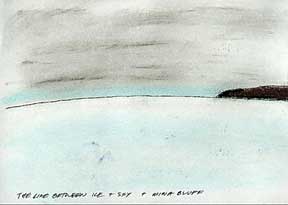In his famous essay about climbing Mt. Ktaadn, the highest mountain in
Maine, Henry David Thoreau writes about a moment when he feels what he
calls "Contact!" with the earth. He writes: "The tops of mountains are
among the unfinished parts of the globe...only daring and insolent men,
perchance, go there...Perhaps I most fully realized that this was
primeval, untamed and forever untamable Nature, or whatever else men
call it, while coming down this part of the mountain." At one point,
then, he becomes rather afraid and awed by his experience and writes
these famous lines: "Think of our life in nature,--daily to be shown
matter, to come in contact with it,--rocks, trees, wind on our cheeks!
The solid earth! The actual world! The common sense! Contact! Contact!
Who are we? Where are we?" Put yourself in a situation where you make
contact with something in the natural world. This cam mean simply
sitting still in a warm place, feeling the rock under your backside. Or
it can mean walking in the wind, climbing a mountain, wading in a
stream, lying in the snow. Write about what it feels like to make that
contact.
Writing Sample:At Siple Dome, a scientific field camp on the
West Antarctic ice sheet, some 500 miles from McMurdo Station, Kendrick
Taylor, a man who studies ice, took me on a snowmobile picnic one sunny
Sunday. We drove out from the camp (a collection of tents and canvas
jamesways--long buildings that look like dark green caterpillars lying
atop the snow) about 10 kilometers on snowmobiles, into the flat
whiteness. We followed a flag line, a line of green flags marking a
safe route along the snow, until we reached the end of it. We stopped
our snowmobiles and Kendrick said to me, "Go ahead another two
kilometers and turn your machine off and just sit. I'll wait here."
So I did.
 I
drove out into the horizon, a horizon like I'd never seen. I could
imagine, if I didn't know better, that I might drive right off the
edge of the earth it was so flat right there. The only thing separating
the earth from the sky in this place is a thin white line and a faint
change in color from white white to blue white. The snowy wind moved
like a fog over the ground, fast, like a slinky, elegant, snaky thing,
throwing off my sense of balance slightly.
I drove for two kilometers, watching the odometer as I went. Then I
stopped, turned off the machine and sat in the quiet. I got off the
snowmobile and lay down in the snow, so that I could feel the coolness
of it all along my back and legs. Bundled in my red parka and wind
pants I wasn't cold. I spread my legs out and my arms out, so I
looked like I might be making a snow angel. All I heard was the wind. I
heard the wind blowing tiny sharp crystals of snow over me, past my
ears. I could feel them blowing over my face. I shut my eyes. When I
roused myself, I looked down at my legs and they were covered with
snow. It hadn't taken more than ten or fifteen minutes to nearly
cover me, to nearly bury me in the snow. I felt a little like a husky
huddled down in a snow cave, a little hole in the snow for its breath;
like the boxes and boxes of cargo lined up around Siple Dome camp and
drifted over with snow, like the jamesways themselves that had to be
unearthed before the Siple Dome workers could even start cooking,
bathing, sleeping in them. How easily I could have disappeared. I
drove out into the horizon, a horizon like I'd never seen. I could
imagine, if I didn't know better, that I might drive right off the
edge of the earth it was so flat right there. The only thing separating
the earth from the sky in this place is a thin white line and a faint
change in color from white white to blue white. The snowy wind moved
like a fog over the ground, fast, like a slinky, elegant, snaky thing,
throwing off my sense of balance slightly.
I drove for two kilometers, watching the odometer as I went. Then I
stopped, turned off the machine and sat in the quiet. I got off the
snowmobile and lay down in the snow, so that I could feel the coolness
of it all along my back and legs. Bundled in my red parka and wind
pants I wasn't cold. I spread my legs out and my arms out, so I
looked like I might be making a snow angel. All I heard was the wind. I
heard the wind blowing tiny sharp crystals of snow over me, past my
ears. I could feel them blowing over my face. I shut my eyes. When I
roused myself, I looked down at my legs and they were covered with
snow. It hadn't taken more than ten or fifteen minutes to nearly
cover me, to nearly bury me in the snow. I felt a little like a husky
huddled down in a snow cave, a little hole in the snow for its breath;
like the boxes and boxes of cargo lined up around Siple Dome camp and
drifted over with snow, like the jamesways themselves that had to be
unearthed before the Siple Dome workers could even start cooking,
bathing, sleeping in them. How easily I could have disappeared.
Analysis:In this piece I tried to give a sense of what it was
like to have Contact with the snow in this way, and how it had
frightened me.
Illustration above is "The Line Between Ice and Sky and Mina Bluff."
Copyright 11.24.97
|
 |
|



